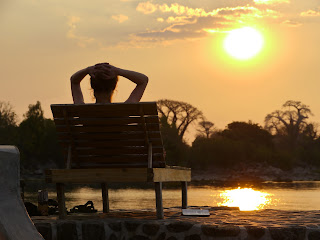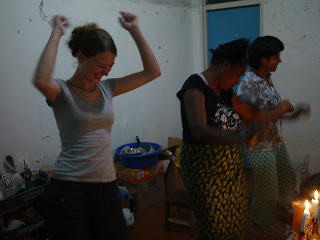...but the journey. That's the saying and it cannot be truer than
when one is hitch hiking. After a month in Namibia exploring both the
South and North with our own hire car I have to say that no single day
has left us with as many impressions and understanding of Namibia as our
first day hitch hiking.
....
Our third lift came within minutes of us wolfing down a quick lunch of bread and horse radish spread. A large truck slowed and pulled off the road in the gravel side lane where we were waiting. It took so long to slow to a stop that we stood watching for the best part of a minute. He rolled down his window as I approached, engine still running. Over the loud purring of the engine I heard nothing of what he said as I strained my neck every upwards to catch maybe a word. He never raised his voice and so our brief conversation was based on me interpreting his facial expressions and relying on social instinct as to which way the conversation was going and answer appropriately. We 'agreed' on a price of $35NAB for the distance, more than we wanted to, and hopped onboard. Our bags occupying the truck cabin's rest area behind the front seats. Although the perspective from the high cabin was spectacular, everything else wasn't. His maximum speed was 80km/h, the average was 60km/h. Our attempts to talk to him resulted in one word answers or just a plain shrug of the shoulders. We found out he came from Walvis Bay this morning, leaving at 3am. That was ten hours ago and he hasn't taken a break yet. That pretty much explained his constant fidgeting as he tried to keep himself awake. But conversation wasn't one of the these methods. As we drove we passed a large burnt patch on the left hand side, the remains of a large truck splayed throughout the zone. We all shifted in our seats uncomfortably.
The one hour trip became two hours and it was now late in the day, at 3pm we reached Otavi.
After fending off several cars that wanted to cram us into the boot of their full cars a sedan type car pulled up with tinted windows and house music blaring out. A light coloured, well-built man got out who could've been a boxer a few years ago but had a small belly growing and laughter lines showing the faint sings of slowing down. The passenger seat was filled with a friend of his of equal if not slightly smaller stature and in the back a lone dark girl, also a paying passenger.
"How much to get to Groofontein?" I asked.
"You decide." He responded, rendering me a bit off guard.
"Ok, how about 20 each?"
"Fine." (Maybe we should've offered less!)
The 60km/h of our previous lift became a cool 120km/h with the air conditioning and house music both on high.
The sun was now lowering itself down in the sky when we arrived in Groofontein making the world seem more yellow but by no means relieving the heat and mugginess. At the fuel station where we were dropped off there was a mini-bus heading up to Rundu, our 'fingers-crossed-let's-hope-we-can-get-there' destination.
"120 dollars" the driver's assitant began. "But because you were volunteers, 100 dollars"
Volunteers? Neither of us said we were volunteers, but maybe no other tourist does hitch hike late in the afternoon from this out of the way town. Anyway it was too much! So far we had payed 55 dollars to reach to this point and we were three quarters of the way there.
Evelyn volunteered this time to 'do the rounds'. She walked up to all the cars at the fuel pumps asking them of their destination and in her nicest voice asking for a lift. The first said that he's not going to that destination but the second, a couple of young well dressed light ladies in a new black volkswagon said that they are going there but 'would rather not take us as she going at ridiculous speed!'. Evelyn couldn't argue with that logic and so we went back to waiting. The mini-bus was slowly filling up and we were running out of options.
"90 dollars" I asked, trying to negotiate down the price. There was a lot of silence and small discussions and they were not budging. It was looking like we were to pay the 100 dollars when out pulled up the black car just as I was reaching into my pocket. "Jump in" she said. And we were off!
This was our fastest lift. True to her word we zoomed along at 180 km/h in the air conditioned car with black and orange 'fast' seats. The scenery now changed from large cattle ranches to small local farm plots and people living in reed and grass houses in small villages on the side of the road. The trees were more lush and cattle and donkeys roamed along the road in equal numbers. Out of the 2.5 million habitants of Namibia about a million of them live in the north east making it the most densest part of Namibia.
Finally at 7pm just as darkness descended we arrived in Rundu, 700km from our start.















































